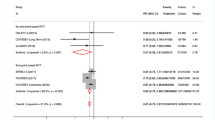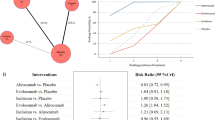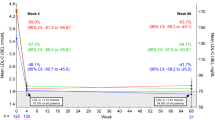Abstract
Background and aims
Proprotein convertase subtilisin/kexin type 9 (PCSK9) inhibitors determine a wide reduction of LDL cholesterol, greater than other lipid-lowering agents. The present meta-analysis is aimed at the assessment of PCSK9 inhibitors effect on LDL Cholesterol, cardiovascular morbidity and all-cause mortality.
Methods and results
A Medline and Clinicaltrials.gov search for eligible studies until December 1, 2017, was performed. All randomized trials (> 12 weeks) comparing PCSK-9 inhibitors with placebo or active drugs were retrieved. Primary endpoints: (a) LDL cholesterol at endpoint; (b) Major cardiovascular events (MACE); (c) All-cause mortality. Data extraction was performed independently by two of the authors, and conflicts resolved by a third investigator. A total of 38 trials fulfilling the inclusion criteria were identified, with mean duration of 36.4 weeks. The reduction of LDL cholesterol at endpoint, versus placebo, ezetimibe, and high-dose statins was − 65.3 [− 69.6, − 60.9]%, − 57.7 [− 68.3;− 47.0]%, and − 34.5 [− 40.8;− 28.1]%, respectively, with alirocumab possibly showing a smaller effect than the other drugs of the class. Treatment with PCSK9 inhibitors was associated with a reduction in the incidence of MACE (Mantel–Haenszel Odds Ratio [MH-OR] 0.83 [0.78, 0.88]), with significant effects of alirocumab and evolocumab only. The number needed to treat for 2 years for preventing one event was 89. All-cause mortality and cardiovascular mortality were not reduced by treatment with PCSK-9 inhibitors (MH-OR 0.94 [0.84, 1.04] and 0.97[0.86;1.09]).
Conclusions
PCSK-9 inhibitors are effective in reducing LDL cholesterol and the incidence of major cardiovascular events in high-risk patients. Bococizumab does not show significant effects on MACE.
Registration number
PROSPERO-CRD42018087640.




Similar content being viewed by others
References
Lipinski MJ, Benedetto U, Escarcega RO, Biondi-Zoccai G, Lhermusier T, Baker NC, Torguson R, Brewer HB Jr, Waksman R (2016) The impact of proprotein convertase subtilisin-kexin type 9 serine protease inhibitors on lipid levels and outcomes in patients with primary hypercholesterolaemia: a network meta-analysis. Eur Heart J 37:536–545
Li C, Lin L, Zhang W, Zhou L, Wang H, Luo X, Luo H, Cai Y, Zeng C (2015) Efficiency and safety of proprotein convertase subtilisin/kexin 9 monoclonal antibody on hypercholesterolemia: a meta-analysis of 20 randomized controlled trials. J Am Heart Assoc. 4:e001937
Navarese EP, Kołodziejczak M, Petrescu A, Wernly B, Lichtenauer M, Lauten A, Buffon A, Wanha W, Pestrichella V, Sardella G, Contegiacomo G, Tantry U, Bliden K, Kubica J, Gurbel PA (2018) Role of proprotein convertase subtilisin/kexin type 9 inhibitors in patients with coronary artery disease undergoing percutaneous coronary intervention. Expert Rev Cardiovasc Ther. 16:419–429
Navarese EP, Kolodziejczak M, Schulze V, Gurbel PA, Tantry U, Lin Y, Brockmeyer M, Kandzari DE, Kubica JM, D’Agostino RB Sr, Kubica J, Volpe M, Agewall S, Kereiakes DJ, Kelm M (2015) Effects of proprotein convertase subtilisin/Kexin type 9 antibodies in adults with hypercholesterolemia: a systematic review and meta-analysis. Ann Intern Med 163:40–51
Schmidt AF, Pearce LS, Wilkins JT, Overington JP, Hingorani AD, Casas JP (2017) PCSK9 monoclonal antibodies for the primary and secondary prevention of cardiovascular disease. Cochrane Database Syst Rev. 4:CD011748
Zhang XL, Zhu QQ, Zhu L, Chen JZ, Chen QH, Li GN, Xie J, Kang LN, Xu B (2015) Safety and efficacy of anti-PCSK9 antibodies: a meta-analysis of 25 randomized, controlled trials. BMC Med. 13:123
Sattar N, Preiss D, Robinson JG, Djedjos CS, Elliott M, Somaratne R, Wasserman SM, Raal FJ (2016) Lipid-lowering efficacy of the PCSK9 inhibitor evolocumab (AMG 145) in patients with type 2 diabetes: a meta-analysis of individual patient data. Lancet Diabetes Endocrinol. 4:403–410
Ferri N, Corsini A, Sirtori CR, Ruscica M (2017) Bococizumab for the treatment of hypercholesterolaemia. Expert Opin Biol Ther. 17:237–243
Ridker PM, Revkin J, Amarenco P, Brunell R, Curto M, Civeira F, Flather M, Glynn RJ, Gregoire J, Jukema JW, Karpov Y, Kastelein JJP, Koenig W, Lorenzatti A, Manga P, Masiukiewicz U, Miller M, Mosterd A, Murin J, Nicolau JC, Nissen S, Ponikowski P, Santos RD, Schwartz PF, Soran H, White H, Wright RS, Vrablik M, Yunis C, Shear CL, Tardif JC, SPIRE Cardiovascular Outcome Investigators (2017) Cardiovascular efficacy and safety of Bococizumab in high-risk patients. N Engl J Med. 376:1527–1539
Sabatine MS, Giugliano RP, Keech AC, Honarpour N, Wiviott SD, Murphy SA, Kuder JF, Wang H, Liu T, Wasserman SM, Sever PS, Pedersen TR, FOURIER Steering Committee and Investigators (2017) Evolocumab and clinical outcomes in patients with cardiovascular disease. N Engl J Med 376:1713–1722
Schwartz GG, Steg PG, Szarek M, Bhatt DL, Bittner VA, Diaz R, Edelberg JM, Goodman SG, Hanotin C, Harrington RA, Jukema JW, Lecorps G, Mahaffey KW, Moryusef A, Pordy R, Quintero K, Roe MT, Sasiela WJ, Tamby JF, Tricoci P, White HD, Zeiher AM, ODYSSEY OUTCOMES Committees and Investigators (2018) Alirocumab and cardiovascular outcomes after acute coronary syndrome. N Engl J Med. 379:2097–2107
Schwartz GG, Szarek M, Bhatt DL, Bittner V, Diaz R, Edelberg J, Goodman SG, Hanotin C, Harrington R, Jukema WJ, Lecorps G, Moryusef A, Pordy R, Roe M, White HD, Zeiher A, Steg G. In: American College of Cardiology—67th Scientific Sessions. 2018
Moher D, Liberati A, Tetzlaff J, Altman DG, PRISMA Group (2009) Preferred reporting items for systematic reviews and meta-analyses: the PRISMA statement. BMJ. 339:b2535
Liberati A, Altman DG, Tetzlaff J et al (2009) The PRISMA statement for reporting systematic reviews and meta-analyses of studies that evaluate healthcare interventions: explanation and elaboration. BMJ 339:b2700
Higgins JPT, Green S (eds). Cochrane handbook for systematic reviews of interventions version 5.1.0. The Cochrane Collaboration, 2011. http://handbook.cochrane.org. Accessed Mar 2011
http://www.crd.york.ac.uk/PROSPERO/display_record.asp?ID=CRD42018087640. Accessed 14 July 2017
Jadad AR, Moore RA, Carroll D, Jenkinson C, Reynolds DJ, Gavaghan DJ et al (1996) Assessing the quality of reports of randomized clinical trials: is blinding necessary? Control Clin Trials 17:1–12
Begg CB, Mazumdar M (1994) Operating characteristics of a rank correlation test for publication bias. Biometrics 50:1088–1101
Egger M, Davey SG, Schneider M, Minder C (1997) Bias in meta-analysis detected by a simple, graphical test. BMJ 315:629–634
Moriarty PM, Thompson PD, Cannon CP, Guyton JR, Bergeron J, Zieve FJ, Bruckert E, Jacobson TA, Kopecky SL, Baccara-Dinet MT, Du Y, Pordy R, Gipe DA, ODYSSEY ALTERNATIVE Investigators (2015) Efficacy and safety of alirocumab vs ezetimibe in statin-intolerant patients, with a statin rechallenge arm: The ODYSSEY ALTERNATIVE randomized trial. J Clin Lipidol. 9:758–769
Baigent C, Blackwell L, Emberson J, Holland LE, Reith C, Bhala N, Peto R, Barnes EH, Keech A, Simes J, Collins R (2010) Efficacy and safety of more intensive lowering of LDL cholesterol: a meta-analysis of data from 170,000 participants in 26 randomised trials. Cholesterol Treatment Trialists’ (CTT) Collaboration. Lancet. 376:1670–1681
Monami M, Sesti G, Mannucci E. PCSK9 inhibitor therapy: a systematic review and meta-analysis of metabolic and cardiovascular outcomes in patients with diabetes. Diabetes Obes Metab. 2018 (Epub ahead of print)
Acknowledgements
This research was performed independently of any funding, as part of the institutional activity of the investigators.
Funding
Edoardo Mannucci has received consultancy fees from Merck and Novartis, speaking fees from Astra Zeneca, Bristol Myers Squibb, Merck, and Novartis, and research grants from Merck, Novartis, and Takeda.
Author information
Authors and Affiliations
Contributions
MM was involved in each of the following points: 1. Design, 2. Data Collection, 3. Analysis, 4. Writing manuscript. SG and BR were involved in each of the following points: 1. Data Collection, 2. Manuscript revision, EM was involved in each of the following points: 1. Design, 2. Data Collection, 3. Analysis, 4. Writing manuscript. All the authors approved the final version of this manuscript.
Corresponding author
Ethics declarations
Conflict of interest
Matteo Monami has received speaking fees from Bristol Myers Squibb, Eli-Lilly, Merck, Novonordisk, Merck, and Takeda, and research grants from Bristol Myers Squibb. Benedetta Ragghianti and Stefano Giannini have no conflict of interests.
Ethical approval
This article does not contain any studies with human participants or animals performed by any of the authors.
Informed consent
This paper did not involve patients enrolled by any of the authors.
Additional information
Publisher's Note
Springer Nature remains neutral with regard to jurisdictional claims in published maps and institutional affiliations.
Electronic supplementary material
Below is the link to the electronic supplementary material.
Rights and permissions
About this article
Cite this article
Dicembrini, I., Giannini, S., Ragghianti, B. et al. Effects of PCSK9 inhibitors on LDL cholesterol, cardiovascular morbidity and all-cause mortality: a systematic review and meta-analysis of randomized controlled trials. J Endocrinol Invest 42, 1029–1039 (2019). https://doi.org/10.1007/s40618-019-01019-4
Received:
Accepted:
Published:
Issue Date:
DOI: https://doi.org/10.1007/s40618-019-01019-4




